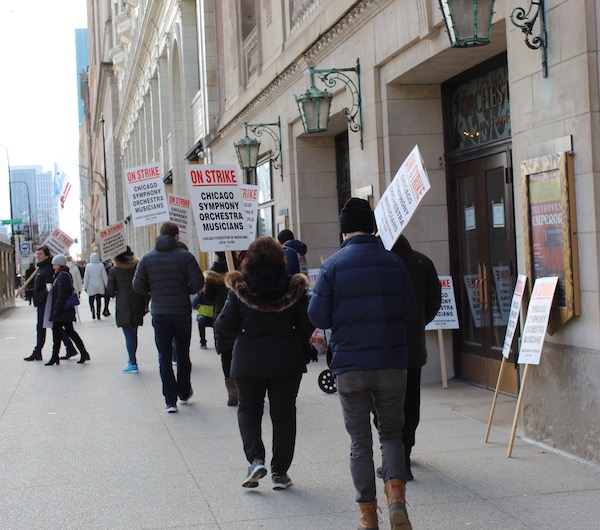Sides remain far apart as striking CSO musicians take to the picket line

On a bright but chilly Monday afternoon about a dozen members of the Chicago Symphony Orchestra were picketing in four-hour shifts on Michigan Avenue outside of Orchestra Hall on the first day of their strike.
There were also musicians picketing at the Adams Street entrance and even the stage door in the alley. A supporter from New Jersey had remotely ordered lunch for the musicians in solidarity, and musicians were munching on pizza.
The musicians voted last month to strike if a new agreement was not reached by the end of their current contract. That agreement ended at 11:59 p.m. Sunday night; with no progress being made, the musicians walking out of contract talks Sunday evening at 9:30.
The main disagreement continues to be the musicians’ firm resistance to management’s equally determined stance on changing their retirement plan from a defined benefit pension plan to a direct contribution plan.
In a telephone press conference late Monday afternoon, CSOA president Jeff Alexander and board chair Helen Zell reiterated their previous statements that changing the plan was essential for the long-term financial health of the orchestra.
Alexander opened the meeting by stating that the strike was “unreasonable and detrimental to the future of the CSO,” and stressed that “the decision to strike was the union’s choice and theirs alone.” Zell added that “It would be irresponsible for the board to offer a pension plan that jeopardizes the future” of the orchestra.
In response to a question, Alexander said that the decision of Riccardo Muti to take the musicians’ side in a very high-profile way did not affect his relationship nor that of the board with the orchestra’s music director. “Neutrality would have been better but the relationship has not been damaged,” he said.
Despite the adamant public statements against the direct contribution pension plan from the musicians, Alexander said he thinks there is some willingness to consider a direct contribution plan, adding that actuaries from both sides have scheduled a meeting for Friday. There are no meetings slated between representatives from both sides until then.
Stephen Lester, CSO bassist and chair of the musicians’ negotiating committee, was among the picketing strikers Monday afternoon. He reiterated that management’s determination to switch from a defined benefit to direct contribution retirement plan is the primary reason they walked out Sunday night.
“It was clear that their desire to shift from a defined benefit program to what is essentially a savings account was one of the chief articles in their [proposal]. They seemed unwilling to negotiate—I mean, they changed their DC plan slightly, but they wouldn’t meet our criteria, which is that it would need to be equal to the plan we currently have.”
Lester said that he had researched pension plans and the pros and cons of direct contribution plans with other orchestras who have switched to a DC plan.
“Most of the orchestras for which they’ve done this, they’ve regretted doing it,” said Lester. “That’s what they’ve told us, and they’ve urged us not to make the same mistake they made. That’s been a powerful statement to us.”
He also expressed frustration with Alexander’s decision to release details of management’s contract proposals to the media over the weekend.
“In all of our negotiations—and I’ve been doing this since 1985—each side has kept to the idea that we will not discuss specific proposals in the press, because we honor each other’s responsibilities to our own constituents. Jeff committed what we consider to be a very unethical act by doing that.”
David Sanders, a member of the negotiating committee and 45-year cellist with the orchestra challenged the CSOA’s narrative and the financial projections they were offering.
“We don’t agree with [the CSOA’s] numbers. They’ve said they’re going to have to spend a lot of money on the direct contribution plan, but we think that money would be best spent on the defined benefit plan. It would give them more stability.”
Also picketing was violinist Gina DiBello, a six-year orchestra member, formerly of the Minnesota Orchestra. Like Sanders, she was skeptical about the numbers the CSOA was putting out about projected future expenses under the defined benefit plan.
“To be honest, I really don’t know [where the numbers are coming from]. From the research we’ve done, it’s very clear that the benefits that we have now far exceed the benefits that they’re proposing.”
DiBello was pessimistic about an early end to the strike, based upon the fruitless negotiations that took place over the past 11 months.
“Not a whole lot has happened in 11 months, to be perfectly honest with you. We’re still very far apart, and the management is still insistent on presenting us with this [direct] contribution plan, which shifts the risk to the musicians and is not feasible for us.
“It doesn’t protect the long-standing health of our well-being, and we feel that it’s not good for the organization in the long-term.”
Posted in News





